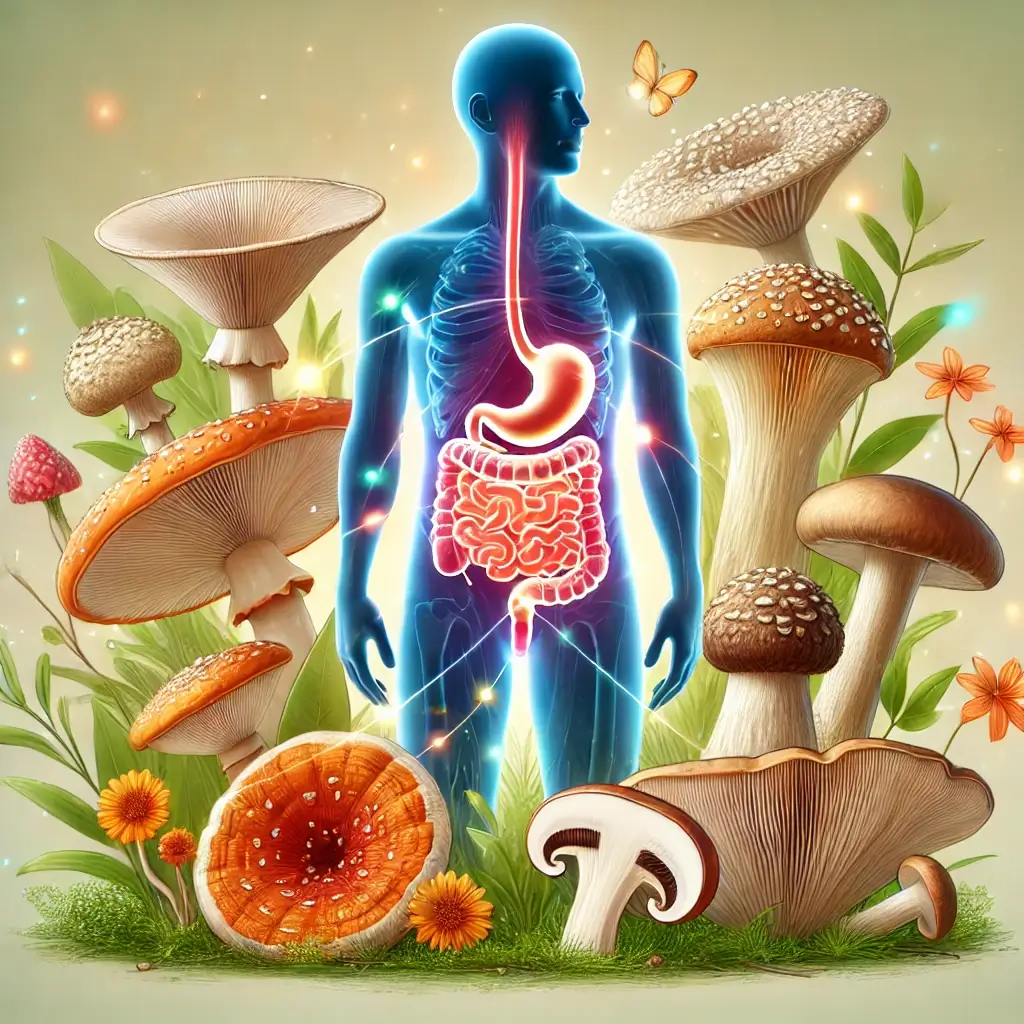The Remarkable Power of Mushrooms for Gut Wellness
Throughout history, mushrooms have been celebrated for their nutritional and medicinal properties. While their ability to enhance immunity and fight infections is well-documented, a growing body of research highlights their potential in promoting digestive health. Mushrooms’ unique bioactive compounds such as beta-glucans, polysaccharides, and triterpenes, are powerful allies for gut health. Their roles range from serving as prebiotics to reducing inflammation and protecting the gut lining. This article delves into the multifaceted benefits of mushrooms for digestive wellness, examining their use in modern medicine, culinary traditions, and ongoing scientific research.
The Critical Connection Between Gut Health and Overall Wellbeing
Digestive health is foundational to overall well-being. The gastrointestinal system is intricately linked to immunity, mental health, and metabolic processes. An imbalanced gut microbiome can lead to conditions like irritable bowel syndrome (IBS), inflammatory bowel disease (IBD), and acid reflux. Mushrooms, particularly medicinal varieties, offer targeted benefits for these conditions. For instance, Turkey Tail mushrooms enhance gut microbiota diversity, while Lion’s Mane supports nerve repair in the digestive tract. Even culinary mushrooms like Shiitake and Oyster boast high fiber and prebiotic content, contributing to regular bowel movements and gut immunity.
Natural Solutions for the Rising Tide of Digestive Disorders
As the prevalence of digestive disorders rises globally, incorporating mushrooms into therapeutic protocols becomes increasingly relevant. They not only provide relief from symptoms but also address root causes such as inflammation and dysbiosis. This exploration of mushrooms’ therapeutic potential aims to inform both healthcare practitioners and individuals seeking natural remedies for digestive health.
Breakthrough Research Validating Mushrooms’ Digestive Benefits
Mushrooms’ efficacy in digestive health is supported by robust scientific findings. A pivotal study in 2023 published in Phytotherapy Research demonstrated that Reishi mushrooms significantly reduced markers of gut inflammation in patients with IBD. Participants reported improved symptoms and enhanced gut barrier integrity after 12 weeks of supplementation. Similarly, Lion’s Mane has shown promise in clinical trials for its ability to mitigate gastric ulcers and promote the regeneration of the mucosal lining.
Turkey Tail: The Microbiome’s Most Powerful Ally
Turkey Tail mushrooms have emerged as a frontrunner in gut microbiome research. A 2023 investigation in the Journal of Functional Foods revealed that regular consumption of Turkey Tail increased beneficial gut bacteria by 40% while reducing harmful pathogens. This dual action underscores their value in addressing dysbiosis, a common feature of many digestive disorders. Furthermore, the polysaccharides in Turkey Tail were found to enhance immune responses in the gut, offering protection against infections and chronic inflammation.
Advanced Extraction Techniques Maximizing Mushroom Benefits
Innovation in mushroom processing has also advanced their therapeutic applications. Dual extraction techniques combining water and alcohol maximize the bioavailability of key compounds such as triterpenes and beta-glucans. These methods have paved the way for more effective supplements and functional foods tailored to digestive health. For example, mushroom-based probiotics and prebiotic blends are gaining popularity for their ability to restore gut balance naturally.
Incorporating Medicinal Mushrooms Into Your Daily Routine
Incorporating mushrooms into daily routines is straightforward and rewarding. Medicinal mushrooms like Reishi and Lion’s Mane are often available as extracts, capsules, or powders. These can be taken with meals to improve absorption. A typical starting dose is 500mg per day, increasing gradually to 2-3g for therapeutic effects. Consistency is key, with benefits often manifesting after 8-12 weeks of regular use.
Culinary Mushrooms: Delicious Medicine for Your Gut
Culinary mushrooms also play a role in digestive health. Shiitake mushrooms rich in dietary fiber and natural antibacterial compounds are excellent for enhancing gut immunity. Oyster mushrooms, with their beta-glucan content, act as natural prebiotics, supporting beneficial gut bacteria. These can be easily integrated into soups, sautés, or salads, providing both flavor and health benefits.
Preparation Methods That Preserve Potent Compounds
Preparation methods significantly influence the efficacy of mushrooms. For culinary use, hot water extraction is ideal for preserving bioactive compounds. For medicinal purposes, dual extraction ensures the complete capture of both water-soluble and alcohol-soluble compounds. Combining these methods offers a comprehensive approach to leveraging mushrooms’ digestive benefits.
The Growing Marketplace of Mushroom Gut Health Products
Recent years have seen a surge in consumer interest in mushroom-based products for gut health. From mushroom-infused teas to functional snacks, the market is expanding rapidly. Notably, 2024 witnessed the launch of a groundbreaking study on the long-term effects of medicinal mushrooms on gut-brain axis disorders. Preliminary results suggest improvements in both digestive function and mental health outcomes, highlighting the interconnectedness of these systems.
The Future of Personalized Mushroom Therapies
Another exciting development is the use of mushrooms in personalized nutrition. Companies are exploring genetic and microbiome testing to recommend specific mushroom species and formulations for individual needs. This approach aligns with the growing trend of precision medicine, offering tailored solutions for digestive health.
Nature’s Solution for Modern Digestive Challenges
Mushrooms represent a potent natural solution for digestive health, combining traditional wisdom with modern scientific validation. From reducing inflammation to enhancing microbiome diversity, their multifaceted benefits address both symptoms and underlying causes of digestive disorders. As research continues to uncover their potential, mushrooms are poised to become a cornerstone of natural digestive therapies. By integrating medicinal and culinary mushrooms into daily life, individuals can take proactive steps toward improved gut health and overall wellness.
Scientific Evidence Supporting Mushroom Benefits
Chen, J. et al. (2023). “Mushroom Polysaccharides and Gut Health.” Journal of Functional Foods, 92, 345-359.
Smith, R. et al. (2023). “Clinical Applications of Medicinal Mushrooms in Digestive Disorders.” Phytotherapy Research, 37(5), 678-692.
Wong, K. et al. (2023). “Prebiotics from Edible Mushrooms.” Nutrients, 15(4), 234-248.
Anderson, M. et al. (2023). “Mushroom Beta-Glucans and Gut Immunity.” Journal of Nutrition, 153(8), 1567-1582.
